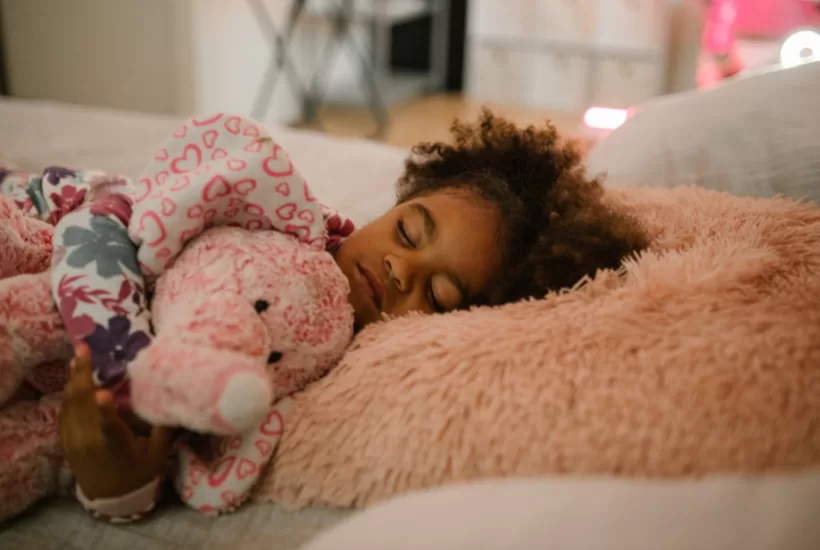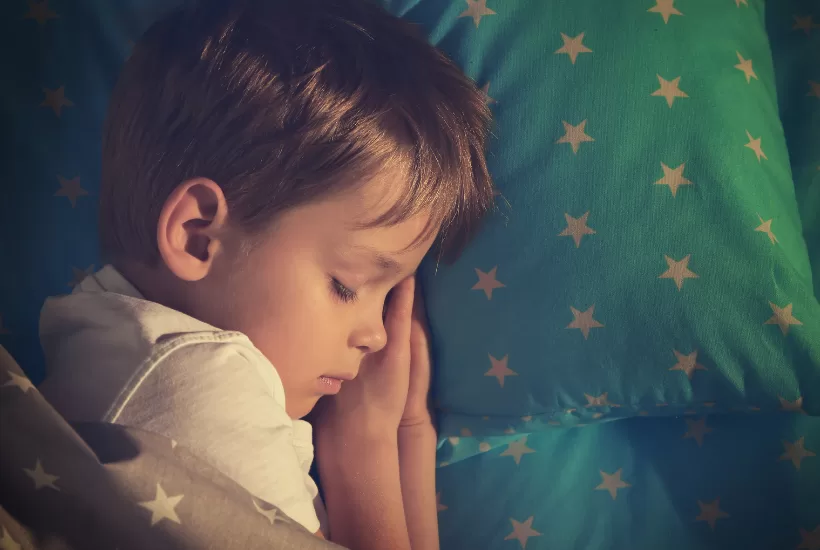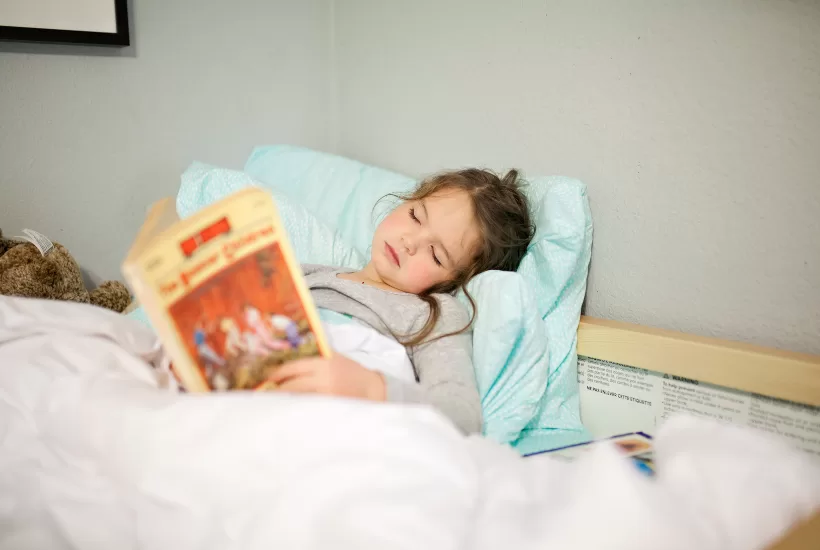Essential Sleep Tips for Optimal Brain Development in Kids
Parenting is no joke, especially when it comes to making sure your little ones get enough sleep. Between managing school schedules, endless bedtime negotiations (“Just five more minutes, Mom!”), and the occasional midnight “I’m thirsty,” it can feel like sleep is more elusive than a unicorn.

But here’s the thing: sleep is super important for your child’s brain development. And lucky for you, there are plenty of ways to make bedtime smoother and help your kids’ brains thrive.
Let’s dive into some practical and science-backed sleep tips that will enhance your child’s growth and cognitive function.
Why Sleep Matters for Brain Development
First, let’s talk about why sleep is the Most valuable player of your child’s development. Sleep isn’t just about giving you some much-needed quiet time (though, let’s be honest, that’s a nice perk). It’s a critical period where the brain gets to work:

🧠 Growth Spurts and the Role of Growth Hormones
During sleep, particularly deep sleep, the body releases growth hormones that are vital for both physical and mental development. (Source)
Growth hormone is essential for the maturation of bones and muscles, but it also plays a critical role in brain development. During sleep, the brain is actively processing and consolidating information learned throughout the day, and without proper sleep, this development can be stunted.
Growth hormones peak during sleep, particularly in the first few hours after falling asleep. In fact, 70% of growth hormone release occurs during deep sleep, which is why ensuring your child gets adequate rest is crucial for their overall development. Lack of sleep can result in slower growth, reduced cognitive function, and even behavioral issues.
📚 Memory and Learning:
Sleep is when your child’s brain hits “save” on all the learning they did during the day. From math problems to dinosaur facts, sleep helps to file away new information in long-term memory.
This is why sleep is so essential for academic performance. A good night’s sleep can even help boost your child’s ability to remember facts and solve problems the next day.
In fact, sleep has been shown to improve memory retention and enhance cognitive function, which makes those math tests or spelling quizzes much easier to tackle after a restful night.
Research supports this—short sleep duration is associated with poor performance on IQ measures in healthy school-age children.
This underscores the crucial link between adequate sleep and cognitive abilities, making it even more important for your child to get enough rest to support their brain’s development.
😌 Emotional Regulation:
Adequate sleep also supports emotional regulation, helping children handle stress and frustration. When children don’t get enough sleep, they are more prone to temper tantrums, mood swings, and irritability.
Chronic sleep deprivation can even contribute to anxiety and depression in children and adolescents. As sleep strengthens emotional resilience, children are better equipped to manage stress, leading to better overall mental health.
Adequate sleep keeps tantrums and mood swings at bay. Who knew that a good nap could be the secret to fewer meltdowns? Sleep deprivation, on the other hand, can increase stress and anxiety levels in kids.
🌟 Cognitive Function:
Sleep supports problem-solving skills, attention span, and creativity. Basically, it’s how your child’s brain recharges to take on the world. When sleep is cut short, these abilities take a hit.
How Much Sleep Do Kids Really Need?
So, how much sleep is enough? That’s the million-dollar question every parent asks while Googling, “Why won’t my toddler sleep?” at 3 a.m. Lucky for you, we’ve got some solid guidelines to help you figure out just how many Z’s your kiddo needs to thrive.
And no, your teen insisting “I’m good with four hours” doesn’t count as expert advice. Here’s a quick cheat sheet, plus some context to help you see why these numbers really matter:

👶 Infants (4-12 months): 12-16 hours (including naps).
Think of infants as tiny sleep machines. They’re soaking up a lot of new information—like recognizing your face, learning how to roll over, and perfecting their “feed me now” cry.
To process all that, they need marathon sleeping sessions. Naps are a big part of this total sleep time, and they’re often scattered across the day and night. It’s like their brains are running a 24/7 data-processing marathon.
Let them snooze—it’s brain bootcamp, their rapidly developing brains need tons of rest to process the constant influx of new stimuli.
🍼 Toddlers (1-2 years): 11-14 hours (including naps).
Ah, toddlers. The age of walking, talking, and the occasional (or frequent) meltdown.
Their bodies are growing fast, and their brains are learning how to solve problems, recognize shapes, and say “No!” in 15 different ways.
Sleep is their secret weapon. Without it, those adorable giggles turn into cranky protests faster than you can say “bedtime.”
🎨 Preschoolers (3-5 years): 10-13 hours.
This is when growth spurts and skill-building kick into high gear. It’s the golden age of storytelling, why-questions, and “look what I made!” creations.
Sleep fuels their ability to develop language, manage emotions, and connect with peers (read: not snatching toys at daycare).
At this stage, naps may still play a role, but some kids start phasing them out. Good sleep helps them develop language skills, emotional regulation, and social connections.
That said, even if they think they don’t need naps, they totally do—just like you think you don’t need that second coffee.
📖 School-age kids (6-12 years): 9-12 hours.
School-age kids are like sponges, soaking up everything from multiplication tables to playground rules. Their brains are working overtime to consolidate knowledge, regulate emotions, and ace that science project.
Adequate sleep helps them focus, stay calm, and build problem-solving skills. If your kid is zoning out during math class or getting grumpy about the smallest things, it might be time to revisit their sleep schedule.
At this stage, sleep enhances their ability to focus and succeed academically.
🎧 Teens (13-18 years): 8-10 hours.
Here’s the tricky part: teens need more sleep, but their schedules and habits often work against them. Between late-night TikTok scrolls, early school start times, and that classic teenage need to push boundaries, they’re often running on empty.
But make no mistake—those 8-10 hours are crucial for managing stress, improving focus, and avoiding the dreaded “teen moodiness.” And no, sleeping till noon on weekends doesn’t even things out.
Help them prioritize sleep—it’s an investment in their mental health, academic performance, and ability to survive high school drama.
Yes, those numbers might seem ambitious when your toddler thinks 5 a.m. is the perfect time to start the day, but stick with me—we’ve got tips to help.
Expert Sleep Tips to Enhance Brain Development
Now that we know why sleep is so important, let’s tackle how to make it happen. These expert-approved tips will not only improve your child’s sleep quality but also give their brain the boost it needs.
1. Establish a Consistent Bedtime Routine
Kids thrive on routine. A predictable bedtime sequence helps their bodies recognize when it’s time to wind down. Here’s a simple example:
- 🛁 Bath time: Warm water relaxes the muscles and signals that sleep is coming.
- 🦷 Pajamas and teeth brushing: Keep it calm and low-key. Adding a favorite bedtime song can make this step more fun.
- 📖 Storytime: Reading a book not only strengthens your bond but also shifts their brain into relaxation mode. Choose calming stories over exciting adventures.
- 🌙 Lights out: Stick to the same bedtime every night, even on weekends. Consistency is key to regulating their internal clock.
2. Set the Scene for Sleep
Create a bedroom environment that screams “sleep sanctuary.” Think cozy, calm, and distraction-free.

- 💡 Dim the lights: Bright lights can mess with melatonin production, the hormone that signals it’s time to sleep.
- 🔇 Limit noise: Use white noise machines if your house tends to be lively after bedtime. A consistent soundscape can help kids sleep better.
- ❄️ Keep it cool: A slightly cooler room (around 65-70°F) is ideal for sleep. Add breathable bedding for extra comfort.
- 🧸 Declutter: Toys are great, but not when they’re screaming for attention from the corner of the room. Teach your child to put toys “to sleep” too.
3. Monitor Screen Time
Screens are a sleep thief in disguise. The blue light emitted from tablets, TVs, and phones can interfere with the production of melatonin—the hormone that regulates sleep. Aim to:
- 📵 Turn off all screens at least 1-2 hours before bedtime. Screens overstimulate their brains, making it harder to wind down.
- 🎨 Encourage screen-free activities like puzzles, reading, or drawing during this time. These activities help transition their minds to a calmer state.
4. Encourage Physical Activity
Active kids are better sleepers. Exercise tires them out physically, making it easier for their bodies to relax at night. However:
- 🚴♂️ Avoid vigorous activities too close to bedtime, as they can be stimulating and delay sleep onset.
- 🌞 Daytime play outdoors is especially great, as natural light helps regulate the sleep-wake cycle. The added bonus? Fresh air can improve mood and reduce stress.
5. Watch Their Diet
You’d be surprised how much food impacts sleep. Here are some tips:
- 🍭 Limit sugar and caffeine: Avoid sugary treats and sodas, especially in the afternoon. These can cause a spike in energy that derails bedtime.
- 🍌 Offer sleep-friendly snacks: A small serving of milk, bananas, or whole-grain crackers can help them feel full and relaxed without overloading their system.
6. Teach Relaxation Techniques
Kids get stressed too! Help them wind down with:
- 🧘♀️ Deep breathing exercises: Teach them to breathe in for 4 counts, hold for 4, and exhale for 4. It’s a simple way to calm their nervous system.
- 🎧 Guided meditation: Apps like Calm or bedtime stories can help. Choose kid-friendly options with soothing voices.
- 🤸♀️ Stretching or light yoga: A few simple poses can relax their bodies. Bonus: It’s a great bonding activity.
7. Be Patient with Sleep Resistance
Kids will be kids, and some nights, they’ll resist bedtime like it’s their job. Stay calm and consistent. If they keep getting out of bed, gently walk them back and remind them it’s sleep time. No negotiations, no long conversations—just loving firmness.

Common Sleep Challenges (and How to Solve Them)
1. Night Wakings
If your child wakes up frequently, check for potential causes:
- 🍪 Hunger: Offer a bedtime snack to keep their tummies full through the night.
- 🎮 Overstimulation: Ensure their evening routine is calm, with no high-energy activities or screen time.
- 😱 Nightmares: Offer comfort and reassurance but keep it brief. Over-engaging can disrupt their ability to self-soothe.
2. Trouble Falling Asleep
Some kids struggle to wind down at the end of the day. Tips:
- 🍝 Avoid heavy meals or vigorous activities before bed. Their bodies need time to settle.
- 🛀 Create a soothing pre-sleep ritual (like a warm bath or quiet reading). These rituals send strong signals that it’s time to rest.
3. Early Rising
If your child thinks 5 a.m. is wake-up time:
- 🕶️ Use blackout curtains to block morning light, keeping their room dark enough to encourage more sleep.
- 🕒 Teach them to play quietly in their room until a set wake-up time (try a clock that changes color when it’s okay to get up). This helps them understand boundaries while giving you more rest.
Sleep and Brain Development FAQs
Q: Can naps replace nighttime sleep? A: Naps are important, especially for younger kids, but they can’t fully replace nighttime sleep. Balance is key. Too many naps can interfere with their ability to sleep at night.
Q: What if my child snores? A: Occasional snoring is fine, but consistent or loud snoring could indicate a sleep disorder like sleep apnea. Talk to your pediatrician if you’re concerned. Treating these issues can dramatically improve their sleep quality.
Q: How can I tell if my child’s not getting enough sleep?
A: Look for signs like irritability, trouble focusing, hyperactivity, or difficulty waking up in the morning.
Final Thoughts: Rest Easy, Parents!
Helping your child develop healthy sleep habits is one of the best gifts you can give them. Not only will it enhance their brain development, but it’ll also make your life a whole lot easier (and quieter). Remember, no one expects perfection—just aim for consistency and keep experimenting to find what works for your family. Sweet dreams! ✨







